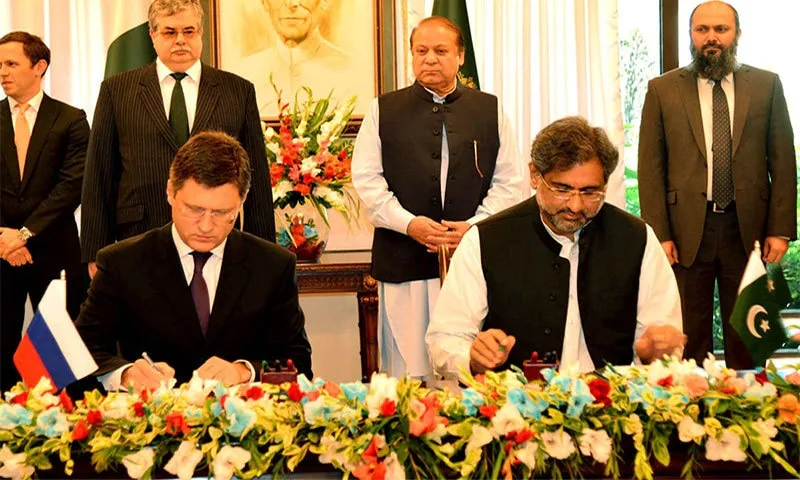Islamabad, Pakistan: Once again a Russian delegation is in Pakistan to negotiate oil and gas supply to Pakistan at discounted rates. It is believed that the delegation may also discuss the mysterious delays in executing North-South Gas Pipeline Project.
The delegation met PM Shehbaz Sharif on January 19, 2023, and state media reported that the delegation led by the Russian Energy Minister Nikolay Shulginov held a positive meeting with Prime Minister Shahbaz Sharif in Lahore and discussed energy collaboration including issues related to the gas pipeline that has been facing enigmatic delays since the Economic Coordination Committee (ECC) of the Cabinet in its meeting held on January 10, 2015, approved the North-South Gas Pipeline Project under the government-to-government arrangement.
It may be mentioned that Pakistan signed a mega project with the Russian government to initiate South-North Gas Pipeline that would carry liquefied gas from Karachi port to Lahore and Kasur. Pakistan and Russia signed this project in October 2015; however, nothing concrete has so far surfaced and the sole project Pakistan and Russia signed so far is facing difficulties in execution.
According to available information, the project was scheduled to kick off in the year 2016 but is yet to be in shape as Russian companies kept negotiating with Islamabad without any concrete results. Experts in the Oil and Gas sectors believe that the construction did not begin because authorities in Islamabad are not showing their serious interest in the project.
Several meetings held since 2015 for delivering gas from the ports of Karachi and Gwadar in the south of Pakistan with power plants and industrial gas consumers in Lahore. The proposed North-South Gas Pipeline is 1,100 km long, with a capacity of about 12 billion cubic meters of gas a year.
In November 2015, the Russian news agency TASS reported that Russia’s largest energy company “Gazprom” was interested in supplies of liquefied natural gas (LNG) to Pakistan. The state-run news agency reported that Gazprom was interested in entering the Pakistani market with LNG – this will ensure the maximum throughput of the pipeline, which is to be built in the future.

In January 2016, the then Minister for Petroleum Shahid Khaqan Abbasi visited Russia and underlined the need for the completion of the project at the earliest. The visit was held in the context of the reported international sanction on a Russian firm designated to lay the pipeline from Karachi to Lahore but both parties claimed that the sanctions were not of such a nature that bars the company to undertake the project to meet increasing gas demand of power and industrial sectors of the country. It was decided that by March 2016 technical details would be settled and the project’s practical work will start.
On October 16, 2015, the agreement was jointly signed by the then Federal Minister for Petroleum and Natural Resources Shahid Khaqan Abbasi, and the then Russian Energy Minister Alexander Novak in a ceremony attended by the then Prime Minister Nawaz Sharif. Project papers of the South-North Gas Pipeline showed that Russia will invest $2 billion in the project, the first phase of which was expected to conclude by December 2017. The 1,100-kilometre pipeline with a capacity of 12.4 billion cubic meters per annum will connect Karachi’s liquefied natural gas (LNG) terminals with those in Lahore.
In June 2017, the head of the state corporation, Sergei Chemezov, said that project was postponed for 2019 due to the lack of agreements on the tariff for pumping gas but in early September 2017, the then Russian Deputy Energy Minister Yury Sentyurin said that Russian companies were likely to start building the North-South gas pipeline in 2018. However, nothing appeared on the surface.
In July 2017 the then Russian Ambassador to Pakistan Alexey Dedov while talking to the media said that the North-South gas pipeline project was yet to be finalized between Russia and Pakistan and the construction of an 1122-kilometer gas pipeline from Karachi to Lahore which is known as the North-South Gas Pipeline Project (NSGPP) was under negotiation for fixing fee charges for transporting the gas etc. He informed the media that the experts were negotiating financial modalities.
In April 2018, the then Prime Minister Shahid Khaqan Abbasi and the Vice President of POWERCHINA Limited Li Yanming witnessed the signing of a Memorandum of Understanding (MoU) between Inter-State Gas Systems (ISGS) of Pakistan and Power China for laying of North-South Gas Pipeline held in Sanya, a City on the southern end of China’s Hainan Island. Prime Minister Abbasi also witnessed the signing of another MoU between Pakistan State Oil (PSO) and Power China for the construction of an up-country deep conversion oil refinery and the laying of a crude oil pipeline.
From 2018 to the year 2022, there was a complete lull over this project because of the change of government in Pakistan. In January 2020, a Russian delegation headed by Russia’s Deputy Energy Minister Anatoli Tichinov held a bilateral meeting with the then Minister for Energy Omar Ayub Khan, and the Prime Minister’s Special Assistant on Petroleum Nadeem Babar. It was observed that North-South Gas Pipeline Project was transparent, financially viable, and to the mutual benefit of both Pakistan and Russia and it would start without further delay.
In April 2021, Russian Foreign Minister Sergey Lavrov while addressing the Joint Press Conference along with the then Foreign Minister Shah Mahmood Qureshi at the Ministry of Foreign Affairs in Islamabad said that Russia was desirous of the early launch of the North-South Gas Pipeline Project with Pakistan.
Now in January 2023, the project is again in the news headlines because Pakistan is trying to get discounted oil and gas from Russia and it would be an opportunity for the Russian government to fix issues once and for all engulfing the North-South Gas Pipeline Project. What would the result of this new wave of meetings would determine future Pak-Russia relations in the energy sector?
